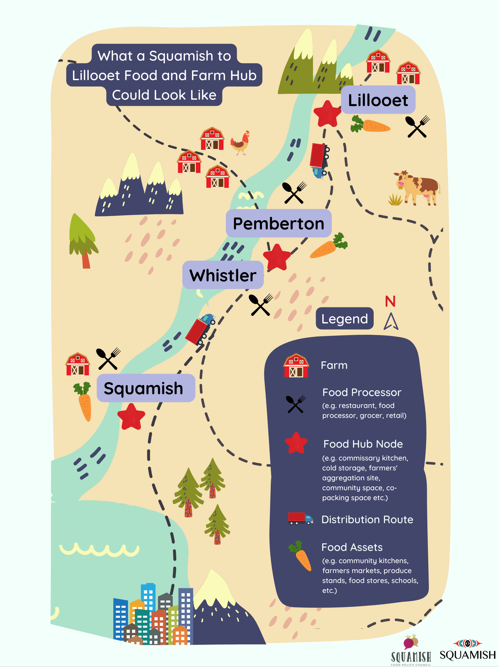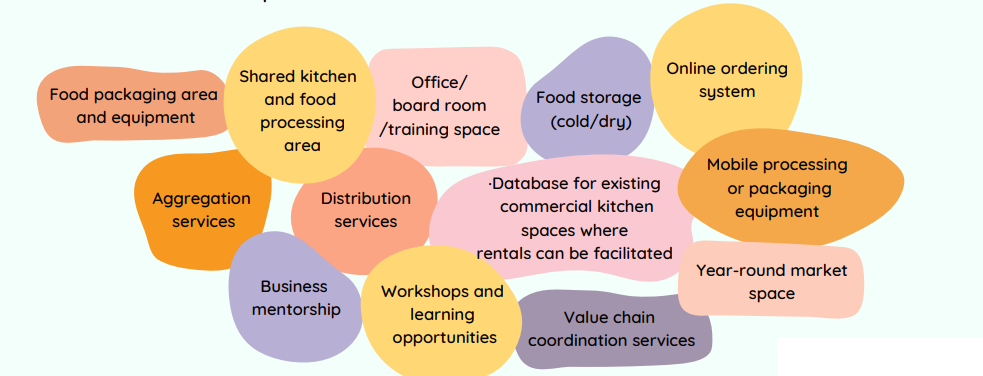Food and Farm Hub Feasibility Plan
The Squamish Food Policy Council (SFPC) and the District of Squamish (DoS) are developing a Squamish to Lillooet Food and Farm Hub Feasibility Plan (the Plan).
The purpose of the Plan is to understand the circumstances under which, and with what components, a food and farm hub(s) would work in the Squamish to Lillooet region. A regional scope is being applied to support a thriving local food economy that aims to shorten the supply chain by considering the needs and addressing the current barriers farmers and food businesses are facing.
What is a Food and Farm Hub?
A food and farm hub provides a network of food and farm infrastructure and programming within a region to strengthen the area's local food economy. It can involve the collaboration of farmers, processors, distributors, retailers, supporting organizations, and consumers to aggregate and distribute resources to make food available and/or increase the strength of the related supply-chains in each area.
What are the benefits of a Food and Farm Hub?
Food and farm hubs refer to shared-use food and beverage processing facilities that offer food and agriculture businesses access to commercial processing space, equipment, expertise and resources to support business development and growth.
Further, food self-reliance has been identified as a key climate change strategy in BC. The Squamish to Lillooet region is largely dependent on imported foods. The area is also facing population growth, development pressure on agricultural land, and increased risks of flooding, wildfire and drought due to climate change. A regional food and farm hub would strengthen the region's food security by building food self-reliance while simultaneously strengthening the local economy.
What can a Food and Farm Hub include?
Food and farm hubs vary in size, scale and composition based on the needs and capacity of the region in which they are located. There is flexibility for hubs to offer resources and services that are regionally-tailored for shared food processing and innovation. Hub components can include a combination of:
The purpose of the Plan is to understand the circumstances under which, and with what components, a food and farm hub(s) would work in the Squamish to Lillooet region. A regional scope is being applied to support a thriving local food economy that aims to shorten the supply chain by considering the needs and addressing the current barriers farmers and food businesses are facing.
What is a Food and Farm Hub?
A food and farm hub provides a network of food and farm infrastructure and programming within a region to strengthen the area's local food economy. It can involve the collaboration of farmers, processors, distributors, retailers, supporting organizations, and consumers to aggregate and distribute resources to make food available and/or increase the strength of the related supply-chains in each area.
What are the benefits of a Food and Farm Hub?
Food and farm hubs refer to shared-use food and beverage processing facilities that offer food and agriculture businesses access to commercial processing space, equipment, expertise and resources to support business development and growth.
Further, food self-reliance has been identified as a key climate change strategy in BC. The Squamish to Lillooet region is largely dependent on imported foods. The area is also facing population growth, development pressure on agricultural land, and increased risks of flooding, wildfire and drought due to climate change. A regional food and farm hub would strengthen the region's food security by building food self-reliance while simultaneously strengthening the local economy.
What can a Food and Farm Hub include?
Food and farm hubs vary in size, scale and composition based on the needs and capacity of the region in which they are located. There is flexibility for hubs to offer resources and services that are regionally-tailored for shared food processing and innovation. Hub components can include a combination of:
We envision a future food and farm hub(s) as a network of nodes and infrastructure that support the diverse needs of the region to establish a strengthened food system.
Questions about the Food & Farm Hub Feasibility Plan? Contact Gabriela Lech, Food Systems Manager, at [email protected].
Resources
Best Practices Report
As part of the Food & Farm Hub Feasibility Plan, the SFPC, in conjunction with the District of Squamish, has sought data to best inform a potential food and farm hub(s) in the Squamish to Lillooet region. Collecting information and insights from existing hubs is imperative in the endeavor to better understand successes, challenges, and lessons learned of organizations (i.e. non-profits, businesses, cooperatives) who have already undergone this process. Learning from existing case studies is useful in identifying what would best work in our region. Check out the findings in the Best Practices report here.
Interim Report
As part of the Food & Farm Hub Feasibility Plan, the SFPC, in partnership with the District of Squamish (District), has completed a research and engagement period with the intent of best informing a potential food and farm hub(s) in the Squamish to Lillooet region. The first phase of the research and engagement period involved identifying best practices of food and farm hubs in North America (see Best Practices report above). The second phase involved conducting a region-wide survey to food producers and food processors in the region to understand infrastructure needs. The Interim Report compiles all of the information gathered during the research and engagement period. Check out the Interim Report here.
Questions about the Food & Farm Hub Feasibility Plan? Contact Gabriela Lech, Food Systems Manager, at [email protected].
Resources
Best Practices Report
As part of the Food & Farm Hub Feasibility Plan, the SFPC, in conjunction with the District of Squamish, has sought data to best inform a potential food and farm hub(s) in the Squamish to Lillooet region. Collecting information and insights from existing hubs is imperative in the endeavor to better understand successes, challenges, and lessons learned of organizations (i.e. non-profits, businesses, cooperatives) who have already undergone this process. Learning from existing case studies is useful in identifying what would best work in our region. Check out the findings in the Best Practices report here.
Interim Report
As part of the Food & Farm Hub Feasibility Plan, the SFPC, in partnership with the District of Squamish (District), has completed a research and engagement period with the intent of best informing a potential food and farm hub(s) in the Squamish to Lillooet region. The first phase of the research and engagement period involved identifying best practices of food and farm hubs in North America (see Best Practices report above). The second phase involved conducting a region-wide survey to food producers and food processors in the region to understand infrastructure needs. The Interim Report compiles all of the information gathered during the research and engagement period. Check out the Interim Report here.


